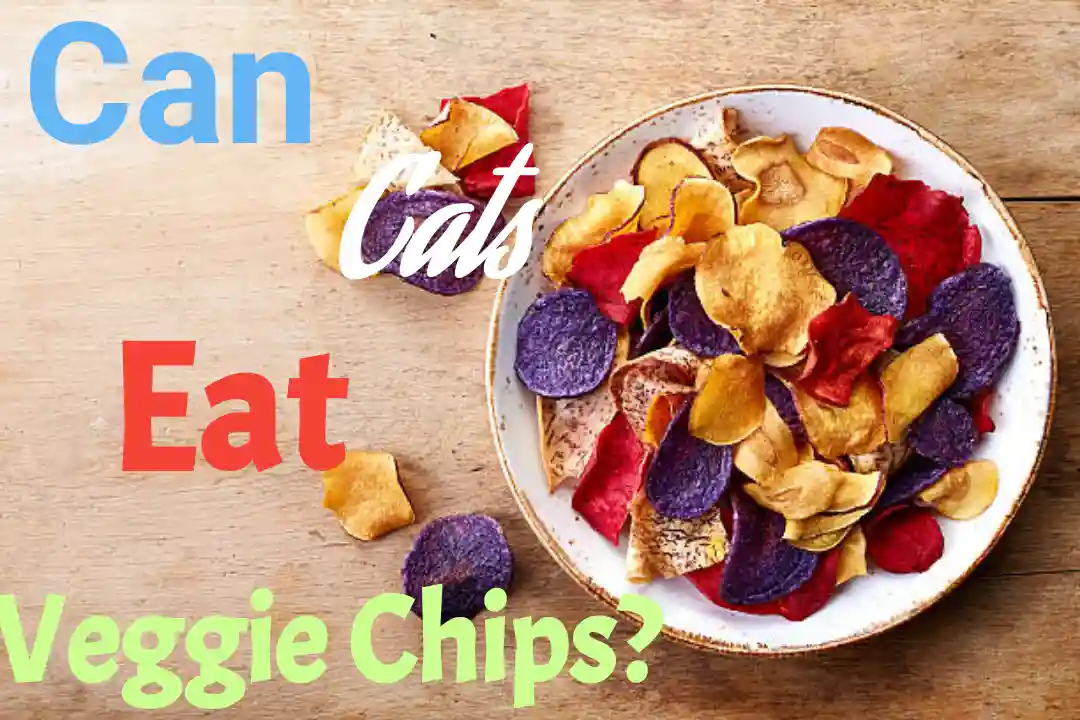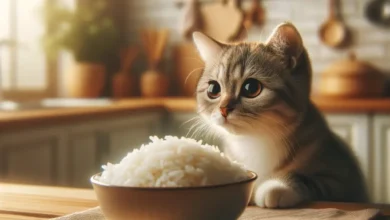Can Cats Eat Veggie Chips? Is Veggie Chips Safe For Cats?

Veggie chips are my favorite go-to snack when gaming or relaxing with a movie. The crunch reminds me of roasted pumpkins I love making for my cat, who loves it on her lick mat. My cat will always race toward me each time she hears the sound of wrappers, but is it a good idea to give in to her curious eyes?
Veggie chips are not necessarily toxic to cats as they may not be able to consume the amount that will lead to panic and a rush to the vet. Still, unless you’re thorough with your feline’s medical care, you may not be sure what ingredient in a veggie chip could cause an allergy in your cat or poisoning. Let’s look deeper at veggie chips for cats and their possible risks.
Table of Contents
- Can Cats Eat Veggie Chips?
- Is veggie chips safe for cats?
- Do Veggie chips provide any nutritional benefits for your cats?
- What Are Some Risks of Feeding Cats Veggie Chip
- Treatments if your cat has Veggie Chips poisoning
- Alternatives to veggie chips for cats
- Can Cats Have Veggie Chips? Final Thoughts
What Are Veggie Chips?
Veggie chips are a delicious and healthy alternative to regular potato chips. They are made from vegetables such as potatoes, carrots, beets, sweet potatoes, and even kale. These chips are a great way to get your daily dose of vegetables without having to sacrifice the flavor and crunch that comes with the traditional potato chip.
Veggie chips are generally made by slicing and dehydrating the vegetables and then frying them in oil. The dehydration process helps to preserve the crunch and flavor of the vegetables, which is what makes them so delicious. The vegetables are also cooked at a low temperature to retain their nutrients and vitamins.
Veggie chips come in various flavors, including BBQ, ranch, and cheddar. They can be served as a snack, topping for salads, or enjoyed alone as a healthy alternative to chips. They are also a great addition to a variety of dishes, such as burritos, tacos, and even soups.
Can Cats Eat Veggie Chips?
In determining what human snacks can be edible or not for your feline friends, you have to consider certain factors: things your cat is allergic to and common ingredients found in human foods that could be harmful to your cat.
Veggie chips are not lethal to cats, but they contain ingredients that could harm your cat if consumed in large quantities. Cats can eat a small amount of veggie chips, but since it has no reasonable nutritional value for cats, they shouldn’t be made a staple treat.
Is veggie chips safe for cats?
Veggie chips are not unsafe for cats except if consumed in large quantities. Although this human snack is safe for humans, its condiments and method of preparation might just not be safe for your feline friend.
Each 100g pack contains 473 calories, fats, and sodium. In the raw form, the veggies and chips are packed with so many nutrients, but after it’s processed, the nutrients diminish, making them unsafe for your cat in large quantities.
Below is a breakdown of ingredients and how they could affect your cat’s health.

Salt
The salt content of veggie chips is relatively high. Just as salt can cause different types of diseases in humans, salt can cause lots of conditions in cats. But cats have lower sodium thresholds which means it will take a lesser amount of salt to cause sodium poisoning in cats.
A single serving of veggie chips contains 220mg of sodium, making it quite a salty snack. The advised amount of sodium a cat should take is 1.25g/kg of body weight. If your feline friend is left to ingest many veggie chips, the following hazards may occur:
- Hypertension
- Sodium poisoning
- Cardiac disorders
- Dehydration
- Kidney diseases
Cornstarch
The is no depart of toxicity of cornstarch to cats. However, cornstarch is more of a carbohydrate and provides your cat with very little to no nutritional value, which makes it entirely irrelevant when considering your cat’s dietary needs.
Oil
Given that veggie chips are usually deep fried in high-temperature hydrogenated oils, which increases their fat content, which makes them a terrible choice for cats. Your feline friends are not meant to be consuming foods that are fried as it can cause the following;
- Pancreatitis
- Diabetes
- Obesity
- Weakness
- Cardiac disorders
Potato starch
In a research carried out in 2018 by the FDA, non-grain foods such as potatoes, peas, and legumes generally were considered to cause Dilated Cardiomyopathy in cats. When this research concluded in 2019, it was discovered that although potatoes could cause DCM, there are lots of other scientific factors that could lead to DCM.
A few veggie chips will not send your feline friend to the vet. Still, continuous large amounts will put your cat’s heart through the discomfort and pain that comes with not being able to pump blood effectively and an enlarged heart which is primarily the effect of DCM.
Tomato paste
Tomatoes are safe for cats generally, but in the paste form, this may not always be true as some tomato paste contains preservatives that may not be safe for your feline friend then, salt and sugar.
Garlic and onion Powder
The N-propyl disulfide chemical compound in garlic and onion will cause your feline’s red blood cells to break down, leading to Hemolytic Anemia. Your cats should never be allowed to take in any food containing onions and garlic as it will cause the following:
- Weakness
- Anemia
Do Veggie chips provide any nutritional benefits for your cats?
No, while some nutrients are listed on the pack, such as iron, calcium, dietary fiber, and potassium, they are not in sufficient quantities to benefit your cat.
Once the potatoes are processed, they contain more fats, sodium, carbohydrates, and cholesterol which, by far, surpasses any benefit they are likely to get
What Are Some Risks of Feeding Cats Veggie Chip
Your cat will undoubtedly be fine if they chow down some of your leftover veggie chips. However, if they eat an amount that doesn’t sit well with their system, they are likely to show the following symptoms:
- Running stools
- Vomiting
- stomach aches
If the sodium content is much, the cat will show the following signs:
- Excessive urination
- Lethargy
- Muscle Spasm
- Fever
- Convulsion
In cases of onion poisoning, you should expect to see the following signs:
- Reduced appetite
- Problems in breathing
- Weakness
Treatments if your cat has Veggie Chips poisoning
As soon as your cat displays signs of sodium or onion and garlic toxicity, it would be best if you got them medical help as soon as you can. The fundamental thing to do is to take along with you the same snack pack that your cat just consumed.
Emetics will be used to induce vomiting in your cat, and IV fluids and electrolytes will be used in cases of dehydration. If you want time, your cat may have brain swelling or a heart attack. Prompt and professional help can never be substituted.
Alternatives to veggie chips for cats
Cats are obligate carnivores, so it’s essential to ensure that they get the proper nutrition — and that doesn’t mean they need to eat a diet of only meat. Here are some great alternatives to veggie chips that your cat will love.
1. Freeze-dried meat: Freeze-dried meat is an excellent alternative to veggie chips because it still provides your cat with a good source of protein. Freeze-dried meat is typically made from chicken, turkey, or beef and is packed with flavor and nutrition. Since it is freeze-dried, it can easily be stored and used as a healthy and convenient snack for your cat.
2. Cooked eggs: Cooked eggs are an excellent source of protein and amino acids, which are essential for a cat’s health. Cooked eggs, such as scrambled eggs or omelets, can be a great way to give your cat something different than veggie chips.
3. Tuna: Cats love tuna, especially when it’s freshly opened! Canned tuna can be a healthy alternative to veggie chips and provide your cat with protein and other nutrients. Be sure to check the label for sodium content, as some brands may have higher sodium amounts than others.
4. Canned fruits and vegetables: Canned fruits and vegetables are a great source of fiber and other essential vitamins and minerals for cats. Canned fruits and vegetables can be a great alternative to veggie chips as long as they don’t contain threatening preservatives or sugar.
5. Dried fish: Dried fish can also be a great alternative to veggie chips. Dried fish is high in protein and can give your cat a tasty snack. Just be sure to check the label for sodium content, as some brands may have higher sodium amounts than others.
Be sure to talk to your veterinarian about the best options for your cat’s specific needs.
Can Cats Have Veggie Chips? Final Thoughts
Veggie chips are safe for humans to snack on, but it’s not so safe to let your cat have some as it was specifically formulated for humans and not cats, so it’s bound to have ingredients that may not sit well with your cat’s body system.
It’s always better to side with what’s safe and avoid stories and possible problems that could arise from giving your cat veggie chips. Do you have any questions? Let’s hear from you in the comment section.




